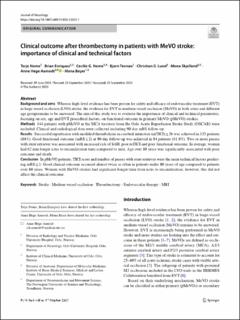| dc.contributor.author | Nome, Terje | |
| dc.contributor.author | Enriquez, Brian Anthony | |
| dc.contributor.author | Nome, Cecilie | |
| dc.contributor.author | Tennøe, Bjørn | |
| dc.contributor.author | Lund, Christian | |
| dc.contributor.author | Skjelland, Mona | |
| dc.contributor.author | Aamodt, Anne Hege | |
| dc.contributor.author | Beyer, Mona K. | |
| dc.date.accessioned | 2024-01-11T12:08:20Z | |
| dc.date.available | 2024-01-11T12:08:20Z | |
| dc.date.created | 2023-10-30T13:42:50Z | |
| dc.date.issued | 2023 | |
| dc.identifier.citation | Journal of Neurology. 2023, 1-10. | en_US |
| dc.identifier.issn | 0340-5354 | |
| dc.identifier.uri | https://hdl.handle.net/11250/3111089 | |
| dc.description.abstract | Background and aims
Whereas high-level evidence has been proven for safety and efficacy of endovascular treatment (EVT) in large vessel occlusion (LVO) stroke, the evidence for EVT in medium vessel occlusion (MeVO) in both sexes and different age groupremains to be answered. The aim of this study was to evaluate the importance of clinical and technical parameters, focusing on sex, age and EVT procedural factors, on functional outcome in primary MeVO (pMeVO) strokes.
Methods
144 patients with pMeVO in the MCA territory from the Oslo Acute Reperfusion Stroke Study (OSCAR) were included. Clinical and radiological data were collected including 90-day mRS follow-up.
Results
Successful reperfusion with modified thrombolysis in cerebral infarction (mTICI) ≥ 2b was achieved in 123 patients (84%). Good functional outcome (mRS ≤ 2) at 90-day follow-up was achieved in 84 patients (61.8%). Two or more passes with stent retriever was associated with increased risk of SAH, poor mTICI and poor functional outcome. In average, women had 62 min longer ictus to recanalization time compared to men. Age over 80 years was significantly associated with poor outcome and death.
Conclusion
In pMeVO patients, TICI score and number of passes with stent retriever were the main technical factors predicting mRS ≤ 2. Good clinical outcome occurred almost twice as often in patients under 80 years of age compared to patients over 80 years. Women with MeVO strokes had significant longer time from ictus to recanalization; however, this did not affect the clinical outcome. | en_US |
| dc.language.iso | eng | en_US |
| dc.publisher | Springer | en_US |
| dc.rights | Navngivelse 4.0 Internasjonal | * |
| dc.rights.uri | http://creativecommons.org/licenses/by/4.0/deed.no | * |
| dc.title | Clinical outcome after thrombectomy in patients with MeVO stroke: importance of clinical and technical factors | en_US |
| dc.title.alternative | Clinical outcome after thrombectomy in patients with MeVO stroke: importance of clinical and technical factors | en_US |
| dc.type | Peer reviewed | en_US |
| dc.type | Journal article | en_US |
| dc.description.version | publishedVersion | en_US |
| dc.source.pagenumber | 1-10 | en_US |
| dc.source.journal | Journal of Neurology | en_US |
| dc.identifier.doi | 10.1007/s00415-023-12025-1 | |
| dc.identifier.cristin | 2190022 | |
| cristin.ispublished | true | |
| cristin.fulltext | original | |
| cristin.qualitycode | 2 | |

